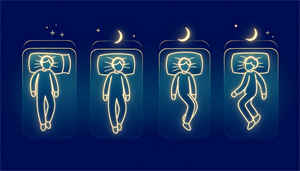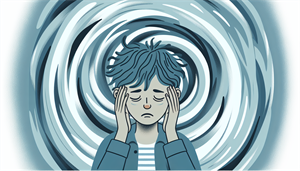Have you ever woken up in the middle of the night with a parched mouth and a snoring partner? You may have fallen victim to mouth breathing, a common issue that can rob you of a good night’s sleep and impact your overall health. But don’t worry. You’re about to embark on a journey to a better, healthier sleep pattern. Let’s dive in and find out “how do I stop sleeping with my mouth open at night?”
Key Takeaways
-
Sleeping with your mouth open can lead to a range of health issues including dry mouth, bad breath, tooth decay, gum disease, and more serious conditions like sleep apnea, which can cause cardiovascular problems and brain damage.
-
Mouth breathing at night can be caused by various factors such as nasal congestion, allergies, deviated septum, obesity, and sleep apnea, leading to poorer sleep quality and systemic health risks.
-
Strategies to promote nasal breathing and stop mouth breathing include clearing nasal passages, adjusting sleep positions, lifestyle changes, mouth taping, using nasal strips or dilators, and consulting specialists as well as improving throat muscle strength with exercises.
The Dangers of Sleeping with Your Mouth Open

Sleeping with your mouth open is more than just a nighttime nuisance. This could signify compromised airway health and potential risks to your overall well-being. It disrupts your sleep by making you more prone to waking up in the night. But that’s not all. It also poses several health risks that range from minor annoyances to severe health conditions, including:
-
Dry mouth and throat
-
Bad breath
-
Tooth decay and gum disease
-
Sore throat and hoarseness
-
Increased risk of respiratory infections
-
Sleep apnea
It’s important to address this issue and find ways to keep your mouth closed during sleep to improve your sleep quality and overall health.
Sleep Apnea and Oxygen Deprivation
Sleep apnea, particularly obstructive sleep apnea (OSA), is a significant sleep disorder that interrupts breathing during sleep and can lead to high blood pressure, stroke, and even potential brain damage. Mouth breathing can worsen this condition by causing relaxation of the soft tissue in your throat, which obstructs your airway and disrupts normal breathing during sleep. Recognizing sleep apnea symptoms is crucial for early diagnosis and treatment.
Even worse, these interruptions in breathing can deprive your brain of oxygen, leading to a potential risk of brain damage. Imagine your brain, the command center of your body, not getting enough oxygen. It’s a scary thought, isn’t it?
We should explore the ways in which mouth breathing can negatively impact your oral health. Comprehending the potential damage it can cause is crucial.
Oral Health Issues
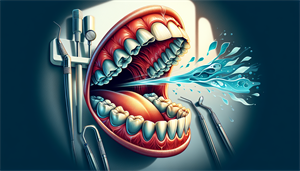
Mouth breathing can cause dry mouth, which, in turn, promotes bacterial growth, leading to cavities and gum disease. You see, saliva plays a crucial role in controlling harmful germs, and when you breathe through your mouth, saliva production drops, creating a playground for cavities to develop.
Additionally, the acidic environment created by mouth breathing can foster bacterial growth, damaging your gum tissues and leading to gum disease. However, the hazards of mouth breathing extend beyond this. Let’s explore how it impacts your overall health.
Impact on Overall Health
Mouth breathing doesn’t just affect your sleep and oral health. It can also contribute to heart disease by decreasing the release of nitric oxide, a crucial player in cardiovascular health, and by increasing the risk of sleep apnea. Sleep apnea is associated with serious health complications like coronary heart disease, heart failure, and stroke, making it a significant concern for mouth breathers.
Furthermore, mouth breathing can hamper sleep quality, resulting in diminished memory, learning ability, and focus. And if that’s not enough, mouth breathing at night can result in daytime fatigue and exhaustion.
Having understood the risks, we can now pinpoint the symptoms of sleep disorders and this sleep-disturbing behavior.
Identifying Nighttime Mouth Breathing
The first step to addressing this problem is to recognize the signs of nighttime mouth breathing. Symptoms to look out for include:
-
Snoring
-
Dry mouth
-
Bad breath
-
Hoarseness
-
Brain fog
-
Feeling tired and irritable upon waking up
If you’ve noticed these signs, it’s crucial to understand what causes mouth breathing and how to diagnose mouth breathing in order to tackle it effectively.
Causes of Mouth Breathing at Night
Mouth breathing at night can be caused by a variety of factors, including:
-
Nasal congestion
-
Allergies
-
Deviated septum
-
Obesity
-
Sleep apnea
These factors can lead to mouth breathing as individuals unable to breathe through their nose resort to breathing through their mouth instead.
Having understood the causes, how can we address it?
Strategies for Encouraging Nasal Breathing
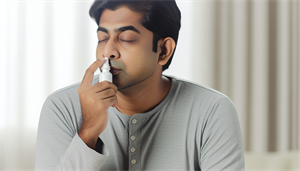
There are several strategies to encourage nasal breathing and curb mouth breathing. These include clearing your nasal passages, adjusting your sleep position, and adopting healthier lifestyle habits to promote nose breathing.
We will now examine each of these strategies in detail.
Clearing Nasal Passages
Clearing your nasal passages can be a game-changer in promoting nasal breathing, especially for those suffering from chronic nasal congestion. One effective method is using saline sprays, which can provide relief from congestion. Effective saline sprays include:
-
Afrin Pump Mist Maximum Strength
-
Children’s Flonase
-
Otrivin Breathe Clean Daily Nasal Wash
-
Cipla Naselin Nasal Spray
-
Xlear Adult Natural Saline Nasal Spray for Sinus
Additionally, humidifiers can also play a crucial role in clearing nasal passages. They increase the moisture in the air, relieving nasal congestion, and facilitating the breakdown of mucus in the nose.
However, does your sleep position affect your breathing?
Sleep Position Adjustments

Your sleep position can significantly impact your breathing pattern. Certain positions open your nasal airway, decreasing the occurrence of mouth breathing. Specifically, lying down in a lateral position and sleeping on your left side can promote nasal breathing and reduce mouth breathing.
If using a wedge-shaped pillow, remember that the ideal elevation for your head and upper torso is between 30 to 60 degrees. Elevating your head while sleeping can reduce snoring and improve sleep apnea. Along with sleep position adjustments, certain lifestyle changes can also help.
Lifestyle Changes
Lifestyle changes can play a significant role in promoting nasal breathing. Reducing alcohol consumption can ease congestion and reduce the likelihood of sleep apnea, thus decreasing mouth breathing. Quitting smoking can also have a substantial positive impact. It reduces inflammation and obstruction in the upper airways, improving breathing. Additionally, it can reduce snoring, sleep-disordered breathing, and stress, while also increasing saliva production to alleviate dry mouth.
Next, we will discuss some potential treatments and interventions.
Mouth Breathing Treatments and Interventions
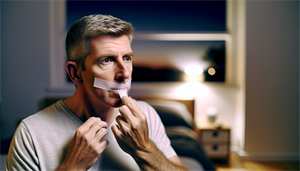
When lifestyle and habit changes aren’t enough to combat chronic mouth breathing, there are various treatments and interventions available to stop mouth breathing. These include mouth taping, using nasal strips and dilators, and consulting a specialist.
Mouth Taping
Mouth taping is an innovative technique to promote nasal breathing. It involves applying a soft patch or tape across your mouth during sleep. Although it may sound intimidating, mouth taping can reduce daytime sleepiness, minimize snoring, and decrease breathing disruptions during sleep.
For safe mouth taping, using 3M medical tape or a specialized mouth tape designed for skin contact is recommended. It’s crucial to apply the tape comfortably, without obstructing breathing. If you experience any discomfort, remove the tape immediately.
Always consult a medical professional before starting mouth taping, especially if you have respiratory issues or severe sleep apnea.
Nasal Strips and Dilators
Nasal strips and dilators can be another helpful tool to improve nasal breathing. They work by widening the nostrils and increasing airflow, which can lead to a reduction in snoring and improvement in breathing.
You can find several options for nasal strips and dilators on the market, including adhesive strips, nasal clips, and internal nasal dilators. They are particularly effective in reducing snoring and enhancing sleep quality. Like any treatment, it may cause some side effects such as mild skin irritation.
Consulting a Specialist
Sometimes, the best course of action is to consult a specialist. Here are some professionals who can provide assistance with mouth breathing issues:
-
Healthcare providers
-
ENT specialists
-
Orthodontists
-
Myofunctional therapists
If you notice any side effects on your oral health, sleep quality, and overall well-being due to mouth breathing, it’s advisable to seek advice from a healthcare provider or doctor. They will conduct a physical examination and investigate any underlying causes that may require attention.
Strengthening Throat Muscles and Improving Breathing Techniques
In addition to the discussed treatments and interventions, enhanced throat muscle strength and improved breathing techniques can be beneficial. Tongue exercises can help by keeping your airway open at night and preventing sleep apnea. Consistent practice of these exercises can usually show results after about three months.
Monitoring Progress and Adjusting Strategies
Lastly, while implementing these strategies and treatments, monitoring your progress and adjusting your strategies based on outcomes is essential. You can track your progress by:
-
Using sleep trackers like the Apple Watch Series 8, Whoop, and Fitbit to monitor your sleep quality
-
Keeping your mouth closed to monitor progress in nasal breathing
-
Using tests like rhinomanometry to assess nasal airflow
By regularly monitoring your progress, you can make informed decisions and optimize your treatment plan.
Summary
In conclusion, mouth breathing at night is a common issue that can have serious health implications. However, by understanding the causes, recognizing the symptoms, and implementing strategies to encourage nasal breathing, you can combat this issue effectively. Remember, a good night’s sleep is not a luxury, it’s a necessity. So, take control and make the necessary changes for a healthier, happier you.
Frequently Asked Questions
How do I stop sleeping with my mouth open?
The best way to stop sleeping with your mouth open is to address the underlying cause. Using humidifiers or nasal saline sprays to reduce nasal congestion can help, along with treating allergies, asthma, or sinus infections.
What causes opening of mouth while sleeping?
Mouth breathing while sleeping can be caused by habits or nasal obstructions such as enlarged adenoids or nasal allergies. This can lead to snoring and disrupted breathing patterns during sleep.
What are the dangers of sleeping with my mouth open at night?
Sleeping with your mouth open at night can lead to sleep apnea, oxygen deprivation, oral health issues, and disrupt your sleep by making you more prone to waking up at night. It can have negative impacts on your overall health.
How can I recognize if I'm a mouth breather?
You may be a mouth breather if you experience symptoms such as snoring, dry mouth, bad breath, hoarseness, brain fog, and feeling tired and irritable upon waking up. Pay attention to these signs to recognize if you are breathing through your mouth.
What strategies can help encourage nasal breathing?
Clearing nasal passages, adjusting sleep position, and adopting healthier habits can encourage nasal breathing.
